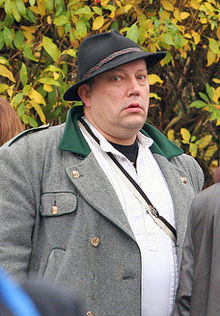Gottfried Küssel
| Gottfried Küssel | |
|---|---|

Küssel in 2008
|
|
| Born |
Gottfried Küssel 10 September 1958 Vienna, Austria |
| Nationality | Austrian |
| Years active | 1976-date |
| Organization |
Volkstreuen Außerparlamentarischen Opposition Gesinnungsgemeinschaft der Neuen Front |
| Known for | Neo-Nazi activist |
| Criminal charge | Reviving Nazism |
| Criminal penalty | Ten year imprisonment |
| Criminal status | Released in 1999, re-imprisoned in 2013 |
Gottfried Küssel (born 10 September 1958) is an Austrian far right political activist who also gained some notoriety in Germany. He has been a leading figure in neo-Nazism and Holocaust denial since the 1970s.
Born in Vienna, Küssel first became involved in politics in 1976 when he became a member of Aktion Neue Rechte, a German New Right organisation, and by his admission joined the NSDAP/AO the following year. He was also a member of the neo-Nazi Kameradschaft Babenberg from 1979 until it was outlawed in April 1980 and around this time also edited the far right magazine Halt.
In the early 1980s Küssel undertook much work amongst football supporters, especially those of Rapid Vienna, aimed at recruiting them to the far right, in particular the Volksbewegung, which he joined in 1982. He was arrested in 1983 and imprisoned on charges of attempting to revive Nazism. Released in 1984, Küssel was involved in a number of minor groups, notably the Nationalen Front and Volkssozialistischen Partei, until in 1986 he established his own extremist movement the Volkstreuen Außerparlamentarischen Opposition (VAPO). A pamphlet that Küssel produced under the VAPO banner outlining his belief that Anne Frank's The Diary of a Young Girl was a forgery brought him to the attention of neo-Nazis in Germany and in 1987 at a gathering in Frankfurt he was recognised by his German counterparts as Bereichsleiter Ostmark, or leader in Ostmark.
VAPO took part in public rallies in Austria whilst also drilling members in military exercises whilst Küssel himself was interviewed on Zick-Zack, a youth programme on ORF, during which he was identified as a neo-Nazi. He also sought to improve his international contacts, holding meetings with the likes of Gary Lauck and Michael Kühnen and in 1992 attending a conference of historical revisionists in Munich at which the likes of David Irving, Fred Leuchter, Mark Weber and Udo Walendy were leading speakers.
...
Wikipedia
